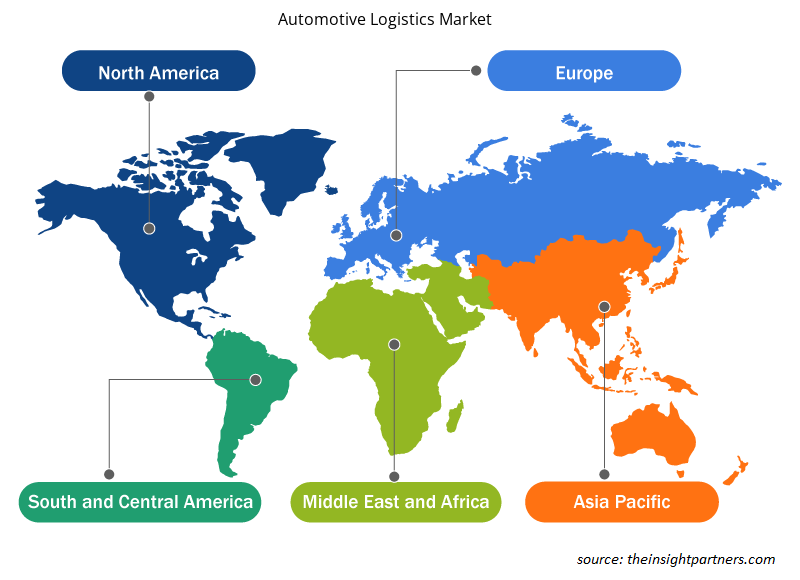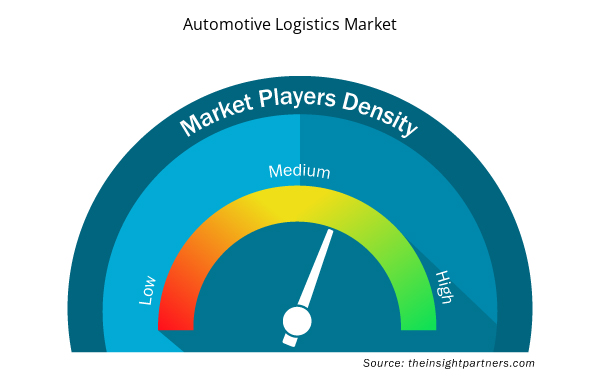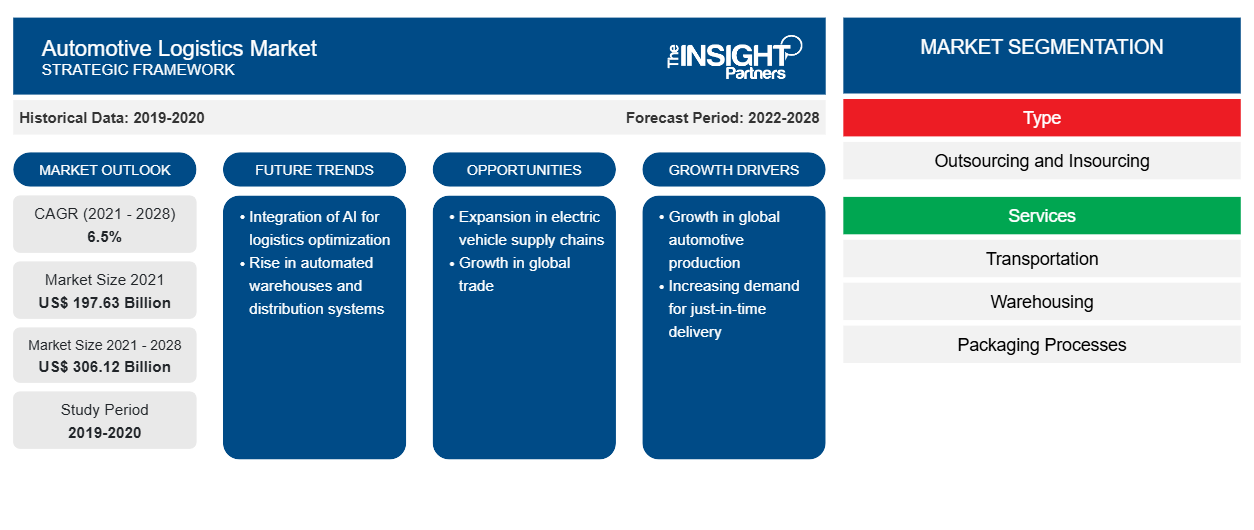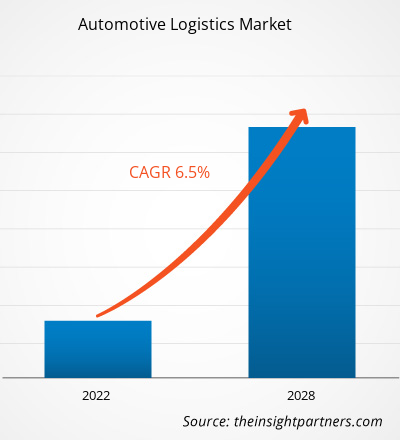[研究报告] 汽车物流市场预计将从 2021 年的 1976.3046 亿美元增长到 2028 年的 3061.2154 亿美元;预计2021 年至 2028 年的复合年增长率为 6.5%。
分析师观点:
汽车物流市场在整个行业的车辆、汽车零部件和备件高效流动中发挥着至关重要的作用。它包括各种专门从事汽车、车辆和汽车物流的公司,提供汽车产品的运输、储存和分销等服务。汽车物流公司负责管理汽车行业复杂的供应链。他们确保车辆从制造厂到经销商或直接到客户的无缝流动。这些公司利用他们在运输和物流方面的专业知识来优化路线、最大限度地缩短交货时间并提高整体效率。汽车物流公司还专注于运输和分销汽车零部件和备件。他们负责采购、储存和将这些部件运送到装配厂或维修中心的复杂任务。通过利用专门的系统和技术,汽车零部件物流公司简化了库存流程,确保在正确的时间提供正确的零件。
物流是汽车和运输行业的重要组成部分,可确保行业平稳运行。它涵盖各种活动,包括汽车仓储、库存管理、包装和逆向物流。有效的汽车物流管理可降低成本、提高客户满意度并提高运营效率。汽车物流市场还提供各种工作机会,包括汽车物流工作。这些角色涉及协调和监督车辆或汽车零部件的运输和交付。从管理物流运营到优化供应链流程,该领域的专业人员在确保汽车产品及时安全运输方面发挥着关键作用。由于对高效供应链管理和及时交付备件的需求不断增加,全球汽车备件物流市场正在经历显着增长。物流顾问提供专业知识和解决方案,以优化汽车备件物流流程,降低成本并提高客户满意度。汽车零部件物流确保备件在整个供应链中的无缝流动。相比之下,汽车物流零件专注于高效运输和分销汽车零部件以满足市场需求。
市场概况:
汽车物流是指将资源(如与成品汽车和汽车零部件相关的机械、库存和供应品)从一个区域安排和运输到预定位置的过程。为了满足客户需求,汽车物流控制着商品从一个原产地到消费地的流动。管理生产公司成品和服务的日常运营是物流管理的主要重点。这种管理可以高效、有效地将物品向前、向后移动并送入仓库。对高效和定制物流服务的需求已成为不同物流服务提供商之间的差异化特征,对于保持市场竞争至关重要。物流服务公司也在整合大数据、物联网 ( IoT ) 和联网船舶等颠覆性技术,以改进其供应链管理系统。
这些技术有助于节省劳动力成本并消除发货延迟。汽车行业的需求对市场扩张产生了重大影响。由于全球购买力的提高和生活水平的提高,预计汽车行业将在未来几年得到显著发展。由于生活方式的转变,新兴国家的汽车销量增加预计将在预测期内推动市场增长。此外,预计在预测期内,道路上大量现有汽车物流对汽车零配件的需求将推动市场发展。
定制此报告以满足您的需求
您可以免费定制任何报告,包括本报告的部分内容、国家级分析、Excel 数据包,以及为初创企业和大学提供优惠和折扣
- 获取此报告的关键市场趋势。这个免费样品将包括数据分析,从市场趋势到估计和预测。
市场驱动因素:
电子商务行业全球扩张推动汽车物流市场增长
电子商务行业的快速扩张已成为汽车物流行业市场增长的重要驱动力。随着消费者越来越多地转向在线平台购买车辆、汽车零部件和备件,对高效物流解决方案的需求猛增。电子商务活动的激增直接影响了汽车、汽车和汽车物流公司,改变了它们的运营方式并扩大了它们的市场潜力。电子商务为汽车销售开辟了新的渠道,消费者现在可以在线浏览和购买汽车。这一趋势要求开发专门的物流服务,以处理在线购买的车辆的运输和交付。汽车物流公司已经介入以弥合在线购买和实物交付之间的差距,确保车辆安全高效地运送到买家所在地。
此外,电子商务的蓬勃发展也刺激了通过在线市场购买汽车零部件和备件的需求。客户现在可以在家中舒适地订购特定的零部件和备件。这种转变导致了专门管理这些物品的存储、包装和交付的汽车零部件物流服务的出现。这些物流供应商利用他们的专业知识来简化供应链,确保及时将正确的零件交付给客户。电子商务行业的扩张也促使汽车物流公司采用创新技术和汽车物流解决方案来增强其运营。
先进的跟踪系统、路线优化软件和实时库存管理工具已成为满足电子商务客户需求的关键。通过利用这些技术,汽车和汽车物流公司可以提供高效透明的服务,确保及时交货和高客户满意度。此外,电子商务行业的增长为汽车物流行业开辟了新的就业机会。汽车物流工作,特别是电子商务履行方面的工作,变得越来越重要。对管理在线订单、协调货运和优化物流运营的专业知识的专业人员需求旺盛。这一趋势导致汽车物流市场劳动力的扩大,促进了其整体增长。
节段分析:
根据类型,汽车物流市场分为:
- 外包
- 内部承包
2020 年,内部采购占据了最大的市场份额,而外包预计在预测期内将实现最高的复合年增长率。汽车物流市场中的内部采购占据了最大的份额。这是因为汽车公司和制造商选择内部管理其物流业务,从而可以更好地控制、查看和利用现有资源。内部采购可以实现定制、差异化以及访问实时数据和分析。虽然外包仍然发挥着作用,但内部采购的主导地位推动了汽车物流市场的整体增长。
区域分析:
2021 年亚太汽车物流市场价值为 867.7 亿美元,预计到 2028 年将达到 1423.4 亿美元;预计在预测期内复合年增长率为 7.3%。亚太地区已确立了其在汽车物流市场的主导地位,并成为领先的地理区域。该地区占据市场主导地位有几个关键因素,包括其强劲的汽车制造业、快速的经济增长和不断扩大的消费者群体。
首先,亚太地区是全球一些最大汽车制造商和生产中心的所在地。中国、日本、韩国和印度等国家汽车行业取得了显著增长,吸引了全球汽车制造商,并促进了大规模制造设施的建立。强大的汽车制造业产生了对汽车物流服务的巨大需求,推动了该地区的市场增长。其次,亚太地区经济的快速增长导致国内消费激增,对汽车的需求增加。随着该地区各国可支配收入的提高,汽车和其他车辆的购买量大幅增加。汽车保有量的增长直接转化为对汽车物流服务的需求增加,包括汽车和汽车零部件的运输、储存和配送。
此外,亚太地区不断扩大的消费者群体在市场主导地位中发挥着关键作用。该地区人口超过 46 亿,为汽车制造商和供应商提供了庞大的客户群。中国和印度等国家中产阶级的崛起和城市化进程的加快创造了庞大的汽车市场。汽车需求的增长需要高效可靠的汽车物流服务,以确保及时交付并满足消费者的期望。此外,亚太地区在物流运营中积极采用先进技术和数字化。随着电子商务的兴起以及供应链管理系统、实时跟踪和数据分析等技术驱动解决方案的整合,该地区提高了汽车物流服务的效率和有效性。
这项技术进步进一步加强了亚太地区的市场主导地位。政府在基础设施建设方面的举措和投资也为该地区的市场主导地位做出了贡献。亚太地区的国家一直在积极投资交通基础设施,包括公路网络、港口和铁路系统,以支持不断发展的汽车行业。这些基础设施的发展促进了无缝运输和高效的物流运营,使该地区成为汽车制造和物流活动的有吸引力的中心。
北美汽车物流市场拥有强大的行业影响力和先进的物流基础设施,在汽车物流市场中占有重要地位。在北美,汽车和汽车物流公司受益于成熟的汽车制造业、强大的运输网络和对技术进步的关注。北美是主要汽车制造商和蓬勃发展的汽车市场的所在地,主要参与者在美国、墨西哥和加拿大。这些公司对汽车物流服务产生了大量需求,包括车辆和汽车零部件的运输、储存和配送。
知名汽车制造商和供应商的存在推动了该地区汽车物流市场的增长。在交通基础设施方面,北美拥有广泛的公路网络、铁路系统和交通便利的港口。这种基础设施促进了车辆和汽车零部件的高效运输和分销,使汽车物流公司能够优化物流运营。该地区的交通基础设施确保及时交货,实现具有成本效益的运营,并支持汽车物流市场的整体增长。此外,北美强调物流行业的技术进步,重点是数字化和自动化。该地区的汽车物流公司利用供应链管理系统、实时跟踪和数据分析等尖端技术来提高运营效率并提供卓越的客户服务。通过采用这些先进的解决方案,北美的汽车物流公司优化了库存管理,简化了运营,并提高了整体供应链的可视性。
此外,北美见证了电子商务在汽车行业日益增长的重要性。汽车销售和汽车零部件分销的在线平台的兴起刺激了对专业物流服务的需求。北美的汽车物流公司响应这一趋势,开发了定制解决方案,用于运输和交付通过电子商务平台购买的车辆和汽车零部件。对电子商务物流的关注进一步推动了该地区汽车物流市场的增长。政府的政策和举措也有助于该地区深入了解北美汽车物流市场。美国、墨西哥和加拿大政府已经采取措施支持汽车行业并加强物流基础设施。这些措施包括投资交通基础设施、促进跨境贸易协定以及营造有利于汽车制造和物流运营的环境。
汽车物流市场区域洞察
Insight Partners 的分析师已详细解释了预测期内影响汽车物流市场的区域趋势和因素。本节还讨论了北美、欧洲、亚太地区、中东和非洲以及南美和中美洲的汽车物流市场细分和地理位置。

- 获取汽车物流市场的区域具体数据
汽车物流市场报告范围
| 报告属性 | 细节 |
|---|---|
| 2021 年市场规模 | 1976.3亿美元 |
| 2028 年市场规模 | 3061.2亿美元 |
| 全球复合年增长率(2021 - 2028) | 6.5% |
| 史料 | 2019-2020 |
| 预测期 | 2022-2028 |
| 涵盖的领域 | 按类型
|
| 覆盖地区和国家 | 北美
|
| 市场领导者和主要公司简介 |
|
市场参与者密度:了解其对商业动态的影响
汽车物流市场正在快速增长,这得益于终端用户需求的不断增长,这些需求源于消费者偏好的不断变化、技术进步以及对产品优势的认识不断提高等因素。随着需求的增加,企业正在扩大其产品范围,进行创新以满足消费者的需求,并利用新兴趋势,从而进一步推动市场增长。
市场参与者密度是指在特定市场或行业内运营的企业或公司的分布情况。它表明在给定市场空间中,相对于其规模或总市场价值,有多少竞争对手(市场参与者)存在。
在汽车物流市场运营的主要公司有:
- 基华物流公司
- 德铁信克
- 德斯威公司
- DHL International GmbH(德国邮政敦豪集团)
- 乔达
免责声明:上面列出的公司没有按照任何特定顺序排列。

- 了解汽车物流市场顶级关键参与者概况
关键球员分析:
汽车物流市场分析包括 CEVA Logistics AG、DB Schenker、DSV A/S、DHL International GmbH(德国邮政敦豪集团)、GEODIS、Kuehne + Nagel Management AG、日本通运株式会社、Ryder System, Inc.、XPO Logistics, Inc. 和联合包裹服务公司等参与者。在汽车物流参与者中,CEVA Logistics AG 和日本通运株式会社凭借提供多样化的产品组合位居前两位。
最新动态:
汽车物流市场中的公司大量采用并购等无机和有机战略。以下列出了一些近期的关键市场发展:
- 2023 年,密歇根州获得 1300 万美元资金,与戴姆勒北美卡车公司和 DTE Energy 合作开发电动汽车 (EV) 货运卡车的新型充电中心。
- 历史分析(2 年)、基准年、预测(7 年)及复合年增长率
- PEST 和 SWOT 分析
- 市场规模价值/数量 - 全球、区域、国家
- 行业和竞争格局
- Excel 数据集


- Mice Model Market
- Radiopharmaceuticals Market
- Non-Emergency Medical Transportation Market
- Print Management Software Market
- Medical Devices Market
- Investor ESG Software Market
- Underwater Connector Market
- Grant Management Software Market
- Thermal Energy Storage Market
- Rare Neurological Disease Treatment Market

Report Coverage
Revenue forecast, Company Analysis, Industry landscape, Growth factors, and Trends

Segment Covered
This text is related
to segments covered.

Regional Scope
North America, Europe, Asia Pacific, Middle East & Africa, South & Central America

Country Scope
This text is related
to country scope.
常见问题
The transportation services segment led the automotive logistics market with a share of more than 50% in 2020.
Asia Pacific dominated the automotive logistics market in 2020 with a share of more than 40% and is expected to maintain its leading position by 2028.
The major companies in Automotive Logistics includes XPO Logistics, Inc.; United Parcel Service of America; DHL International GmbH (Deutsche Post DHL Group); Ryder System, Inc.; and Kuehne + Nagel International AG.
The insourcing segment led the automotive logistics market with a share of more than 75% in 2020 and its anticipated to dominate over the forecast period. The advantages of insourcing logistics include a complete visibility of the supply chain operations of shipments. Different initiatives have been undertaken by various companies to propel the proliferation of automotive logistics. For instance, in 2017, McLaren Automotive aims to insource the production of carbon fibre chassis by 2020.
The significant proliferation of vehicle manufacturing, within-country sales, and export of vehicles in China is a prominent part of the Belt and Road strategy. China, being the most significant vehicle manufacturing country in the APAC region, produced 27.8 million vehicles in 2018, which showcases the demand for automotive logistics in the country. The rising demand for Chinese manufactured vehicles in these countries is increasingly pressuring Chinese automakers to partner with logistics companies. This factor is posing a significant business growth opportunity for Chinese logistics companies and international logistics partners, thereby, is anticipated to boost the automotive logistics market in the coming years.
The global automotive sector is experiencing significant demand for vehicles, pressuring the vehicle manufacturers to deliver the required number of vehicles. However, the performance of the vehicle manufacturers increased in 2018 and 2019. The surge in demand for passenger and commercial automobiles across the globe is majorly driven by the increase in disposable income and growth in manufacturing units in developed and developing countries. In European and North American countries, an increase in demand for commercial vehicles is witnessed, which led the European and North American countries to experience a growth in the number of commercial vehicle manufacturing units or assembly units.
Trends and growth analysis reports related to Automotive and Transportation : READ MORE..
The List of Companies - Automotive Logistics Market
- CEVA Logistics AG
- DB Schenker
- DSV A/S
- DHL International GmbH (Deutsche Post DHL Group)
- GEODIS
- Kuehne + Nagel Management AG
- Nippon Express Co., Ltd.
- Ryder System, Inc.
- XPO Logistics, Inc
- United Parcel Service of America, Inc
The Insight Partners performs research in 4 major stages: Data Collection & Secondary Research, Primary Research, Data Analysis and Data Triangulation & Final Review.
- Data Collection and Secondary Research:
As a market research and consulting firm operating from a decade, we have published and advised several client across the globe. First step for any study will start with an assessment of currently available data and insights from existing reports. Further, historical and current market information is collected from Investor Presentations, Annual Reports, SEC Filings, etc., and other information related to company’s performance and market positioning are gathered from Paid Databases (Factiva, Hoovers, and Reuters) and various other publications available in public domain.
Several associations trade associates, technical forums, institutes, societies and organization are accessed to gain technical as well as market related insights through their publications such as research papers, blogs and press releases related to the studies are referred to get cues about the market. Further, white papers, journals, magazines, and other news articles published in last 3 years are scrutinized and analyzed to understand the current market trends.
- Primary Research:
The primarily interview analysis comprise of data obtained from industry participants interview and answers to survey questions gathered by in-house primary team.
For primary research, interviews are conducted with industry experts/CEOs/Marketing Managers/VPs/Subject Matter Experts from both demand and supply side to get a 360-degree view of the market. The primary team conducts several interviews based on the complexity of the markets to understand the various market trends and dynamics which makes research more credible and precise.
A typical research interview fulfils the following functions:
- Provides first-hand information on the market size, market trends, growth trends, competitive landscape, and outlook
- Validates and strengthens in-house secondary research findings
- Develops the analysis team’s expertise and market understanding
Primary research involves email interactions and telephone interviews for each market, category, segment, and sub-segment across geographies. The participants who typically take part in such a process include, but are not limited to:
- Industry participants: VPs, business development managers, market intelligence managers and national sales managers
- Outside experts: Valuation experts, research analysts and key opinion leaders specializing in the electronics and semiconductor industry.
Below is the breakup of our primary respondents by company, designation, and region:

Once we receive the confirmation from primary research sources or primary respondents, we finalize the base year market estimation and forecast the data as per the macroeconomic and microeconomic factors assessed during data collection.
- Data Analysis:
Once data is validated through both secondary as well as primary respondents, we finalize the market estimations by hypothesis formulation and factor analysis at regional and country level.
- Macro-Economic Factor Analysis:
We analyse macroeconomic indicators such the gross domestic product (GDP), increase in the demand for goods and services across industries, technological advancement, regional economic growth, governmental policies, the influence of COVID-19, PEST analysis, and other aspects. This analysis aids in setting benchmarks for various nations/regions and approximating market splits. Additionally, the general trend of the aforementioned components aid in determining the market's development possibilities.
- Country Level Data:
Various factors that are especially aligned to the country are taken into account to determine the market size for a certain area and country, including the presence of vendors, such as headquarters and offices, the country's GDP, demand patterns, and industry growth. To comprehend the market dynamics for the nation, a number of growth variables, inhibitors, application areas, and current market trends are researched. The aforementioned elements aid in determining the country's overall market's growth potential.
- Company Profile:
The “Table of Contents” is formulated by listing and analyzing more than 25 - 30 companies operating in the market ecosystem across geographies. However, we profile only 10 companies as a standard practice in our syndicate reports. These 10 companies comprise leading, emerging, and regional players. Nonetheless, our analysis is not restricted to the 10 listed companies, we also analyze other companies present in the market to develop a holistic view and understand the prevailing trends. The “Company Profiles” section in the report covers key facts, business description, products & services, financial information, SWOT analysis, and key developments. The financial information presented is extracted from the annual reports and official documents of the publicly listed companies. Upon collecting the information for the sections of respective companies, we verify them via various primary sources and then compile the data in respective company profiles. The company level information helps us in deriving the base number as well as in forecasting the market size.
- Developing Base Number:
Aggregation of sales statistics (2020-2022) and macro-economic factor, and other secondary and primary research insights are utilized to arrive at base number and related market shares for 2022. The data gaps are identified in this step and relevant market data is analyzed, collected from paid primary interviews or databases. On finalizing the base year market size, forecasts are developed on the basis of macro-economic, industry and market growth factors and company level analysis.
- Data Triangulation and Final Review:
The market findings and base year market size calculations are validated from supply as well as demand side. Demand side validations are based on macro-economic factor analysis and benchmarks for respective regions and countries. In case of supply side validations, revenues of major companies are estimated (in case not available) based on industry benchmark, approximate number of employees, product portfolio, and primary interviews revenues are gathered. Further revenue from target product/service segment is assessed to avoid overshooting of market statistics. In case of heavy deviations between supply and demand side values, all thes steps are repeated to achieve synchronization.
We follow an iterative model, wherein we share our research findings with Subject Matter Experts (SME’s) and Key Opinion Leaders (KOLs) until consensus view of the market is not formulated – this model negates any drastic deviation in the opinions of experts. Only validated and universally acceptable research findings are quoted in our reports.
We have important check points that we use to validate our research findings – which we call – data triangulation, where we validate the information, we generate from secondary sources with primary interviews and then we re-validate with our internal data bases and Subject matter experts. This comprehensive model enables us to deliver high quality, reliable data in shortest possible time.


 获取此报告的免费样本
获取此报告的免费样本